- Home
- John Scalzi
Old Man's War Universe: Short Stories Page 2
Old Man's War Universe: Short Stories Read online
Page 2
We felt Company D deserved its fate, the negotiations a lie and stupidly done at that; ham-handed arrogance that had gotten them stuck, and pleading for our help. We called them the “The Idiots”; we would have left them to die—an object lesson in
incompetence—but we were not allowed a vote. We found ourselves on a world we should not have been on, to retrieve those who should not have needed retrieval, to kill those whose lives we should have not been made to take.
We would not complain about it. This was what we were bred to do. But it did not change the fact; my first mission was fighting someone else’s battle, making it my own by necessity. There was not much of Company D to retrieve; just enough for someone above us to declare victory despite the dead we left behind.
I will not detail the battle. I am here and that is enough.
The first thing I killed danced when I killed it, the force of the bullet spreading across its surface even as the slug traveled through its mass. It danced and spun and twisted and fell, shedding blood in a spiraling helix, angular momentum and gravity bartering for its movement and gravity getting the better end of the deal. It fell and lay sodden and I moved on to the next, already the verb and the action, already movement and purpose. My body moved.
My mind stayed, and in quiet moments in the days that followed returned to the dance, to the spin and slide and the sound of mortality the thing thumped out as it fell. I returned to that sound and imagined what it said: a shout of pain, a brief tattoo of regrets, the name of a lover or a brother or perhaps a mother; a final call backward, a farewell to the one who had given it life or those who filled the life with joy, not to be seen again in the time that remained.
I have the moment recorded. If I chose I could open that moment again, find a translation and know for certain. I choose not to know. I had killed this thing. It deserved to have its final words fly past me, to find those for whom they were meant.
♦♦♦
I think on what I owe those I kill. Clearly I do not owe them their lives, nor do I owe them individual memory; I have killed far too many to mark each with remembrance. My time with nearly all is too short to note much other than that they are dead and I am alive, even if it was a near thing on both counts.
I do not owe them guilt or regret. I have done what I have done. I know what I have done well and what I have done poorly, and for whatever I might be judged, I know no one knows better than I for what things I should be called into account. I know my own measure and will not burden those whom I have killed. If they have souls let them go to where they are bound, without my pleas of forgiveness to chain them to me, and to this world.
What I owe those I kill is understanding. I owe them the courtesy of recognition; acknowledgement that they were something other than just another thing I had to kill on the way to other things I had to kill. I cannot know every creature I have killed; I cannot spare the memory for each of them entire. But I will not pretend they were not my equal. Their lives were their own, and in their way they loved and feared and wondered and hoped. They did not expect me to be the end of all of that.
I will not pretend that all there was to them was the flesh I wounded, the bones I shattered, the blood I made to spill. I will not pretend that it does not matter to them that their lives are at an end. I grieve the loss of those I love and I will not pretend that those I kill are not missed, were not loved, are not grieved.
Some would not choose to do this and I do not fault them. Each of us does what we can to accept ourselves and what we do. But to see those I kill as less than myself lessens myself. I do not have enough of myself to lose that way.
After my first mission I learned of the Thumpers: their culture and ways and world. I learned of their gods and demons, their myths and fables and stories, learned of their art and song and the dances they danced without a bullet to guide them. I became an expert on the creatures I had killed, and when I did the one I made to dance and die took its leave of me.
I learned of the next people I would kill before I killed them, as I have done every time since. It became my job, along with killing, to learn what I could about those we fought and killed, the better to fight them, and the better to kill them—my need to know and understand and recognize those whose lives I end turned to practical use.
It is good to be useful for more than just killing. It is better to know that in my way I honor those I kill, as I would hope they would honor me.
3 Speaking
Let me speak your name. Let me feel the movement of my tongue within my mouth, of lips stretched and jaw pushed slightly forward, of the breath from my lungs shaped and formed into noise and phonemes and syllables and words; into proper nouns signifying you. Two names with marvelous utility: to recall you from memory, to bid for your attention, to speak your identity into the air and in doing so affirm you in your tangible skin, with vibration and waves and exhalation, with the intimacy of sound spoken aloud; with the pleasure that comes from the physical act of declaring you.
Let me speak your name and in speaking let me sing, a secret melody whose notes rise like birds and fall into your ears, to turn you toward me, with a smile that anticipates your own hidden song that choruses with my name. Let me speak your name so I may hear my name spoken to me from you.
You cannot imagine the sensuousness of speech, you who have spoken all your life, you who have mouthed words like bread, a staff of life common on your tongue. You cannot appreciate the luxury speech represents to those of us who have no time for it, we who speed our words, transmitting mind to mind without mediation, not even the briefest pause between mind and mouth to temper what we say or to soften sharp edges.
To speak without words is to speak fast and cheap, to not have to choose words either wisely or poorly but to send them all without discrimination—all content and no style, function over form, everything being what is said and nothing being how it is said. I talk to those I know, one mind to another, efficient and sure. We say what we need to say and then move on. Words do not mean to us what they mean to you and yours. We have other ways to share our emotions and our care and regard. Words do not carry that freight for us; they are light and fast and hollow. Sparrows with fragile bones.
Your words are not like this. Your words are filled, their hollows crammed with meaning, things unsaid nested within, jammed with implication. It is a wonder they do not drop to the floor the moment they leave your mouth. I marvel at what you say and even more how you say it, how your words shift their shape and contain their intent until they are inside me and unpack their contents, to leave me in awe of their economy. So much said with so little.
I cannot do this myself. We speak the same language but build our words differently. Mine are simple and deliberate, yours effortlessly complex. You are not aware of the miracles you make of your words. I cannot do this myself; I do not even try, save when I am speaking your name. With those few words I am your equal, filling the words with complexity and light. Stained glass shining from the inside.
You are so used to what you do with your words that you do not notice the effort I put into mine. I don’t mind. Take for granted that your name flows from my lips. It is a gift to me that you expect it there. Let me speak your name and fulfill your expectation.
♦♦♦
I was not always in love with the spoken word. Those of you born to speech do not know how you tax the patience of those of us born to thought—how our first thought in hearing one of you speak is to wonder at the extent of your damage, to be curious at what sort of trauma could result in such an obvious and slow moving thing such as stands before us. We listen with politeness and internal pity: You cannot be faulted for the deficiencies to which you are born, and we would not choose to point out that they exist.
We listen and wait for our turn to speak, and then speak as slowly as you have been afflicted to do so. We try to get done with it as quickly as possible, because we know how much your sort wish to speak again, straining to pass along inf
ormation along with asides and anecdotes and digressions and irrelevancies, leaving us to filter what you mean from what you say (We are no less verbose but at least we are quicker, when we talk among ourselves through our thoughts). And when you are done, again we speak, briefly and with economy and to the point, speaking what need be said and ignoring that which does not. For our courtesy we are labeled arrogant and curt. It annoys us.
In time I came to appreciate the spoken word, with its implications and intimations and allusions, with its potential of saying more than mere words, its palette of meaning richer and wider than I first grasped. And with that appreciation came exasperation at those gifted with speaking, who could say so much with what they said and how they said it, and chose to say nothing of consequence; who opened their mouth and allowed banality to fall out and thud to the ground; who were unaware that they could do with their words with the barest minimum of effort what I with all my desire could accomplish only haltingly, if at all. It was like being starved and watching those at a feast ignore the best dishes to fill up on bread.
If I could have I would have pushed their faces into their words, to make them see the parody they made of them. But they would have only have been confused and I would only have been more exasperated. There is a saying along the lines of not trying to teach a pig to sing because it wastes your time and annoys the pig. I want you to know how many times I have stood in pig-filled rooms, and longed to annoy.
I did not. I sat and listened to them talk instead, and was amazed to discover more in their words: subtext and overtones, emotional resonances that even those speaking did not know were there, the rhythm and pattern and tone of their speech opening them wide to be read. Books whose messages are not in the text but the footnotes. A library of the human experience.
It took time to translate the language, and I do not imagine I have mastered it. It will never be my native tongue. But I hear it well enough that in hearing it I see those who speak it anew, and once again I have pity for those who speak aloud. Not because they speak so slowly but because so many of them are deaf to all that they say. If they could hear what I hear they would be amazed.
♦♦♦
My native tongue is not a tongue but the flash of neurons decoded and transmitted by machine instead of muscle. But it is my tongue nonetheless: my tongue, my map, my window, my apprehension of the world to myself. I am leaving it behind to be with you. I am an immigrant whose first language will not be simply unused but amputated, the parts of me I used to speak it left behind, no part of who I will be to speak it, even in the silence of my mind.
You do not know how this worries me. It is not that I am to be made to speak aloud a language I love and long to hear but which I speak imperfectly. In time I will speak it well enough. I worry that who I am is in how I know to speak; that I am shaped by my words and how I say them, and that in my deprivation, that which is me will diminish and become something other than what I am and what I am to you.
I am doing something new. I am holding myself in my mind—who I have been and who I am—wordless and silent; no description to resolve into a lexicon spoken or sent, a view of myself immune to travel or translation or amputation. When I move to your world my thoughts will be filled with myself; the measure of my character and deficiencies and desires held mute and in being mute held whole, so that when I am sent to you, I will be who I have been and who I am, so I can be who I will become with you.
I know you would not begrudge me this, that you would want me to think on myself if by doing so I believed that it would keep me myself. But you should know that as I hold myself in my thoughts, to will myself into being myself once more, the version of me I hold to myself holds you in her thoughts. She holds you wordlessly: who you have been and who you are, and who you will become with her. She holds you in her without words or speech and longs to speak your name.
4 Friendship
I rose early the day I killed my friend. I knew that when I killed him I would have to be ready, could not hesitate or be moved by his suffering, but be ready to strike swift and sure, and for that I needed to prepare myself. I needed not to harden myself but to be strong enough to hold myself open, to measure his pain not with detachment but with empathy, to strike him at the precise moment when the balance between his will and his suffering tumbled irretrievably against him; to allow him his struggle but not to struggle needlessly. I was to honor his final moments by judging when they would be, to do what he would not be able to do, and to give him the honor he was due from me and for himself. I rose early and spent the day in silence, and when I was ready and when the time had come, I took my knife and I went to him.
He did not answer his door; it was too late for that. His disease was untreated and untrammeled, sending the impulses of his nerves to bleed into his flesh, to twitch the muscle and fritter away any semblance of control. A friend let me enter and drew me to the rough mat on the floor, on which our friend sat and shook. I knelt in front of my friend and greeted him; drew my knife for him to see and placed it between us, not as a threat but as a promise, fulfillment of his request and my requirement to end his life.
He turned his head toward the knife and reached out a palsied hand to touch it, jostling it slightly as he did so. Told me it would serve, then reached the same hand to me, bidding me to take it. I found that I could not, the hand holding itself up for long seconds before retreating to its owner.
You blame yourself for this still, said my friend. You blame yourself for this disease you gave me, the one that will kill me today. It sits between us like an unwelcome guest.
I will not ask you to absolve yourself of this guilt. You have willingly picked it up and placed it on your shoulders. Only you will be able to set it down again. But know that I do not ask you to carry it for me. I would not have you think you are unworthy to touch my hand, you who are the only one I can trust and who I will trust in this final hour.
You afflicted me with this disease, took me far from my home and far from the people I love, and brought me to this moment. But you have also called me friend, understood me, and have given me honor and do me great honor now.
You have been long forgiven by me, and all that I would have between us now is companionship and love. You are my last and best friend. Remember that when your burden of guilt weighs you down.
♦♦♦
And with those words my friend fell silent, curled himself small and began his wait, holding himself to himself as his body betrayed itself, scattering the messages between body and mind, pushing arms and legs, contorting his silent contemplation into a jester’s pantomime, making a mockery of his dignity—but not so much a mockery that his dignity did not hold.
It was hard to watch him leak and spasm and grunt. But I would not turn away. I watched every moment, silent and observant, owing him witness for the affliction I gave him and the release I would yet give him, until the moment when I became aware with every sense that my friend had arrived at his moment of release. I did not hesitate. I picked up my knife and prepared to find his heart.
There is a moment of surface tension when a knife blade presents its demand and the flesh honors it. An instant of pressure before the puncture, the rip before the slide, a small eternity easy to miss but impossible to ignore if you’ve felt it before. I lived in that moment a great while for the small sliver of time it was there.
And then I moved on, angled my blade in and up, felt its tip pierce its target and slide through the other side, and continued on until the flat of the hilt rested cold on his chest. I moved in close and embraced him, the better to provide leverage to twist the blade, and make the argument to his heart that its work was forever done. The heart did not argue and for that I was grateful.
My friend gripped me as I gripped him, exhaling at the crystal clarity of the knife, cutting through his diffuse and random pain to rally every thought in his body, every final message that coursed along his nerves, toward the goal of reaching his hand to me a second and fi
nal time.
I took it and held it, and wet it with my tears as I bent to kiss it, an action which surprised me and released me, and let me lay my burden down. I’m sure my friend saw it in his failing last moment of life; his last gift to me and my last gift to him, so that all that was between us in the end was companionship and love. He died in my arms and holding my hand, and after a minute I set him down on his rough mat, stepped back to where his other friend stood waiting, and gave our friend’s soul space to depart.
♦♦♦
I did not say goodbye to my friend then, but some time later, as I held his body in my hands, floating in the cold and dark above the brilliant green world of his birth. A place I had come to fulfill a promise: to see him home, to return him to a place from which my actions had kept him while he was still alive. It was not easy to get there and it would not be easy to return, but I had risked my own death for reasons far more trivial. I would not shame my friend or myself by denying him his return home, because it would be inconvenient for me to take him there.
And so I floated above this great green world, body in hand, holding it longer than I should have, whispering words to it that would not carry in the vacuum but which I said nonetheless, before letting it go and releasing it to spiral into the gravity well of my friend’s childhood world. My friend and I paced each other a while, sharing the same orbit, until I turned to make my way back to my own world. I did not turn back to see my friend fall away from me. I had said my goodbyes and was content to let him find his own way home.
I wonder if as he fell those he had loved felt him return home and felt his absence filled, as he shot across the sky and spread himself in it. I like to think they did, not because I am the one who took him from them, but because I loved him too, and in loving him felt his love for them. I hope they looked to the sky, saw him move through it, and were glad to have him home.

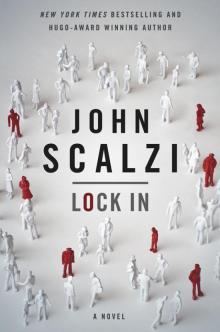 Lock In
Lock In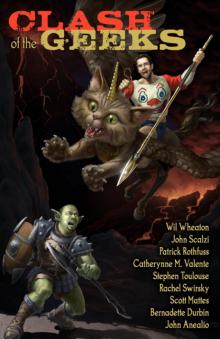 Clash of the Geeks
Clash of the Geeks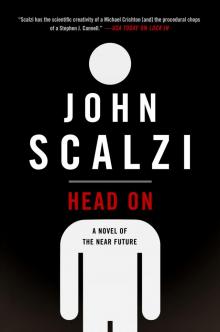 Head On
Head On The Dog King
The Dog King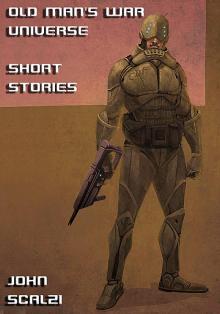 Old Man's War Universe: Short Stories
Old Man's War Universe: Short Stories The End of All Things
The End of All Things Tales From the Clarke
Tales From the Clarke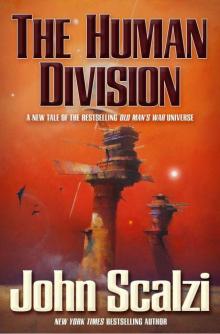 The Human Division
The Human Division The Android's Dream
The Android's Dream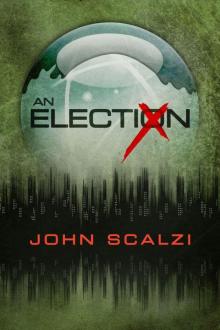 An Election
An Election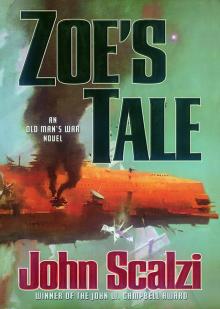 Zoe's Tale
Zoe's Tale Agent to the Stars
Agent to the Stars This Hollow Union
This Hollow Union The Gentle Art of Cracking Heads
The Gentle Art of Cracking Heads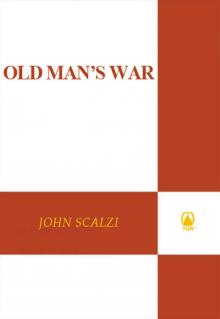 Old Man's War
Old Man's War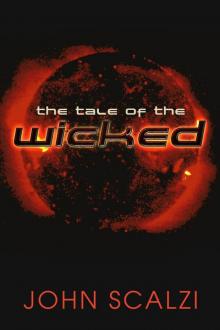 The Tale of the Wicked
The Tale of the Wicked Your Hate Mail Will Be Graded: A Decade of Whatever, 1998-2008
Your Hate Mail Will Be Graded: A Decade of Whatever, 1998-2008 Judge Sn Goes Golfing
Judge Sn Goes Golfing The Back Channel
The Back Channel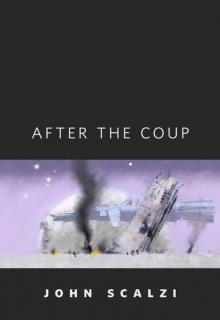 The Human Division 0.5 - After the Coup
The Human Division 0.5 - After the Coup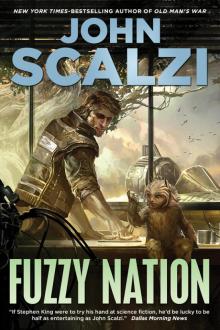 Fuzzy Nation
Fuzzy Nation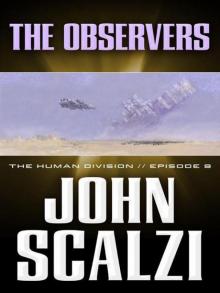 The Observers
The Observers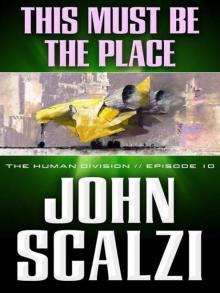 This Must Be the Place
This Must Be the Place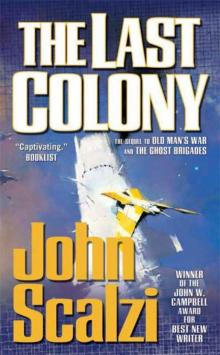 The Last Colony
The Last Colony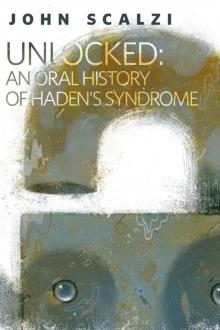 Unlocked: An Oral History of Haden's Syndrome
Unlocked: An Oral History of Haden's Syndrome A Voice in the Wilderness
A Voice in the Wilderness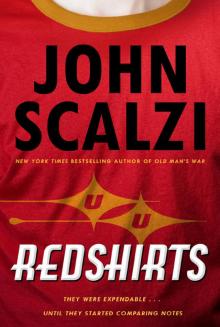 Redshirts
Redshirts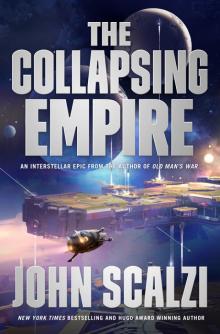 The Collapsing Empire
The Collapsing Empire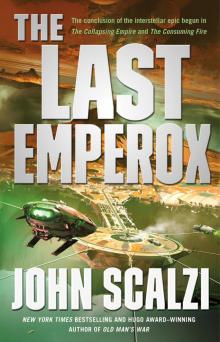 The Last Emperox
The Last Emperox The God Engines
The God Engines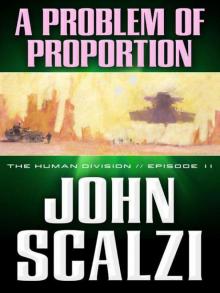 A Problem of Proportion
A Problem of Proportion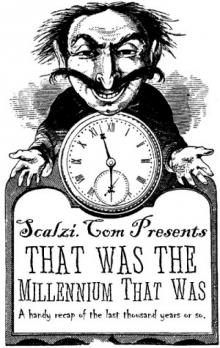 THAT WAS THE MILLENIUM THAT WAS
THAT WAS THE MILLENIUM THAT WAS The B-Team
The B-Team The Sound of Rebellion
The Sound of Rebellion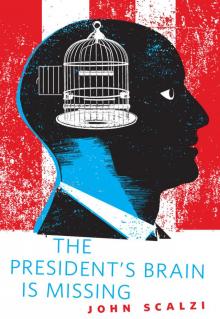 The President's Brain Is Missing
The President's Brain Is Missing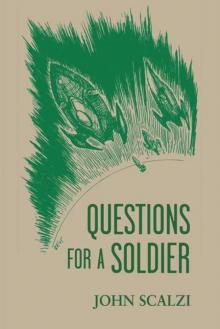 Questions for a Soldier
Questions for a Soldier Walk the Plank
Walk the Plank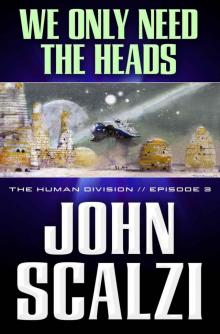 We Only Need the Heads
We Only Need the Heads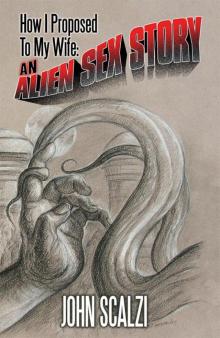 How I Proposed to My Wife: An Alien Sex Story
How I Proposed to My Wife: An Alien Sex Story Earth Below, Sky Above
Earth Below, Sky Above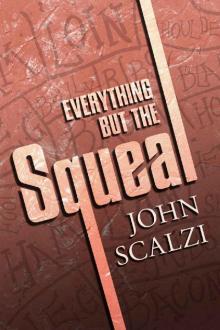 Everything but the Squeal
Everything but the Squeal Old Man’s War
Old Man’s War The Human Division #12: The Gentle Art of Cracking Heads
The Human Division #12: The Gentle Art of Cracking Heads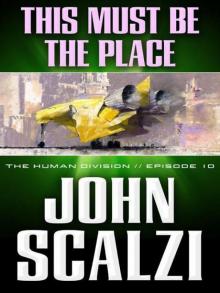 This Must Be the Place thd-10
This Must Be the Place thd-10 A Voice in the Wilderness thd-4
A Voice in the Wilderness thd-4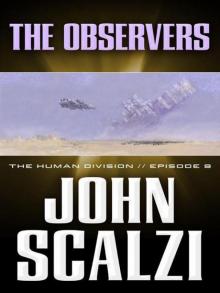 The Observers thd-9
The Observers thd-9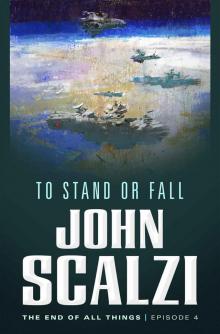 The End of All Things: The Fourth Instalment
The End of All Things: The Fourth Instalment Earth Below, Sky Above thd-13
Earth Below, Sky Above thd-13 Zoe`s Tale вбиос-4
Zoe`s Tale вбиос-4 After the Coup
After the Coup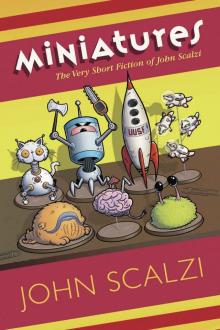 Miniatures: The Very Short Fiction of John Scalzi
Miniatures: The Very Short Fiction of John Scalzi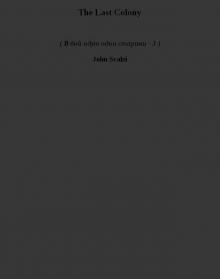 The Last Colony вбиос-3
The Last Colony вбиос-3 Tales From the Clarke thd-5
Tales From the Clarke thd-5 Old Man's War omw-1
Old Man's War omw-1 The Human Division #8: The Sound of Rebellion
The Human Division #8: The Sound of Rebellion The Ghost Brigades omw-2
The Ghost Brigades omw-2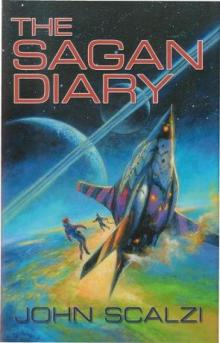 The Sagan Diary (old man's war)
The Sagan Diary (old man's war) The Sound of Rebellion thd-8
The Sound of Rebellion thd-8 The Human Division 13 - Earth Below, Sky Above
The Human Division 13 - Earth Below, Sky Above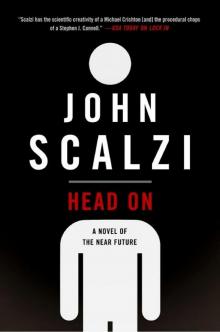 Head On_A Novel of the Near Future
Head On_A Novel of the Near Future The End of All Things: The First Instalment
The End of All Things: The First Instalment The B-Team thd-1
The B-Team thd-1 The Back Channel thd-6
The Back Channel thd-6 Walk the Plank thd-2
Walk the Plank thd-2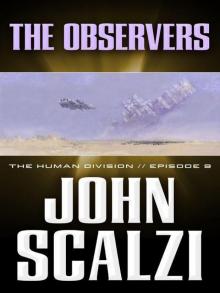 The Human Division #9: The Observers
The Human Division #9: The Observers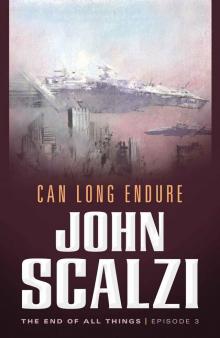 The End of All Things: The Third Instalment
The End of All Things: The Third Instalment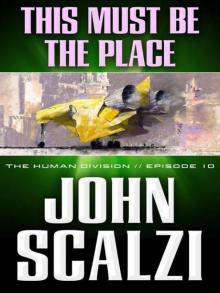 The Human Division #10: This Must Be the Place
The Human Division #10: This Must Be the Place The End of All Things #2: This Hollow Union
The End of All Things #2: This Hollow Union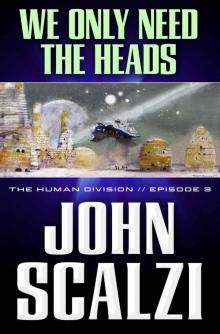 We Only Need the Heads thd-3
We Only Need the Heads thd-3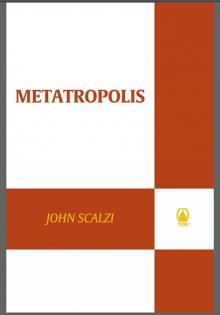 Metatropolis
Metatropolis The Dog King thd-7
The Dog King thd-7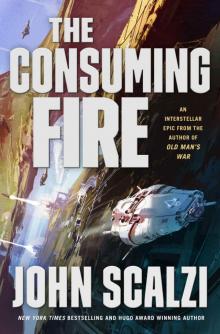 The Consuming Fire (The Interdependency)
The Consuming Fire (The Interdependency)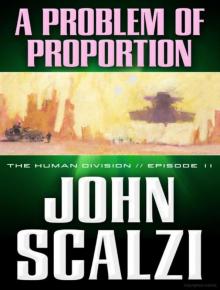 The Human Division #11: A Problem of Proportion
The Human Division #11: A Problem of Proportion